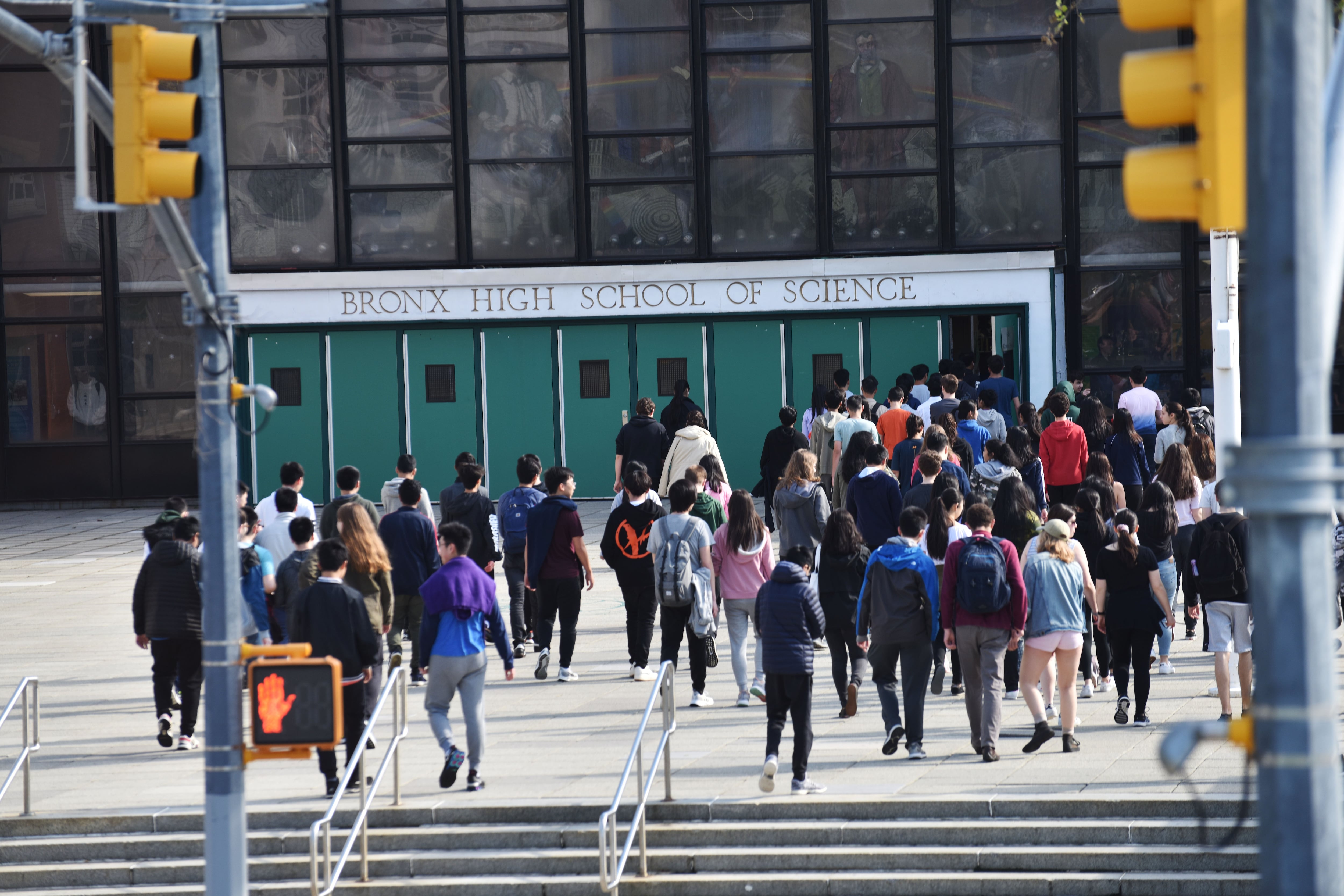Sign up for Chalkbeat New York’s free daily newsletter to keep up with NYC’s public schools.
New York City’s education panel is once again pumping the brakes on a roughly $17 million contract for a computer-based version of the admissions test for the city’s specialized high schools as its members seek additional input from the public on the proposal.
The proposed contract was initially slated for an October vote by the city’s Panel for Educational Policy, or PEP, which votes on major policy proposals and contracts. It was moved to the panel’s Nov. 20 meeting, before being pushed back again at least until December, PEP Chair Gregory Faulkner said this week.
The delay will enable the panel to hold a town hall and gauge public opinion, Faulkner said. The date for the town hall has not yet been set.
The Specialized High School Admissions Test, or SHSAT, stands as the sole metric of admission to the city’s eight specialized high schools, which include Stuyvesant and Bronx Science. Last year, roughly 26,000 eighth graders took the SHSAT, and 4,072 were offered a seat. Of those, just 4.5% of offers went to Black students and 7.6% to Latino students, fueling continued concerns over the schools’ deeply segregated student populations.
Holding a town hall to solicit feedback on the contract is likely to reignite longstanding debates over whether the test should determine entry to the city’s specialized high schools. For years, that question has pitted integration advocates against fervent supporters of the current system.
Under the proposed nearly six-year contract, the test-making company Pearson would be tasked with making a computerized version of the SHSAT, and administering it over five testing cycles beginning in the fall of 2025. The contract includes an optional two additional test cycles, which if enacted would bring the total cost to more than $23.5 million.
Reigniting a longstanding fight over the SHSAT
Some advocates worry that the move to a computerized model for the SHSAT could worsen inequities in an admissions process that already produces highly segregated outcomes. The specialized high schools, which are considered some of the most prestigious public high schools in the nation, have long faced criticism for admitting staggeringly low numbers of Black and Latino students.
Education Department officials previously noted that many exams are now offered on computers — pointing to MAP tests administered twice a year for students in grades 2-8, as well as ongoing efforts to transition to digital SAT and Advanced Placement tests for high school students. The proposed contract also follows a statewide effort to phase in computer-based testing for New York’s 3-8 reading and math exams.
And supporters of the current system are urging PEP members to approve the contract. Parent Leaders for Accelerated Curriculum and Education, or PLACE, a polarizing group that advocates for screened school admissions, has issued an open letter calling on the panel to approve the contract.
“Failure to approve the Pearson contract will leave no other means to administer the test,” the group wrote. “As such, eight NYC high schools will be without a freshman class starting in the fall of 2026.”
But critics have also questioned whether the city should award another contract to Pearson, which has developed the paper version of the exams for years. The national test-making company has faced controversy over high-profile missteps in New York and other states, and in 2015, the state’s Education Department stopped using Pearson for its standardized exams.
Pearson was one of just two vendors that submitted a proposal for the contract, and an evaluation and advisory committee made up of Education Department officials determined Pearson offered “the lowest price while proposing superior services,” according to city documents.
Though the current specialized high school admissions system has its share of critics across the five boroughs, efforts to overhaul it in past years have also faced fierce opposition and court challenges — signaling that the city’s families remain divided over the issue. The exam is mandated under state law, and though some, including former Mayor Bill de Blasio, have sought to overturn that law, such efforts have failed to gain traction in Albany.
Despite his own questions over whether the exam is a fair metric of admission, Faulkner acknowledged that the contract may still have to be approved, given the lack of clear alternatives.
“We have to really look at what it would mean if this were to be voted down,” he said.
Jessamyn Lee, a Brooklyn parent and PEP member who opposes the contract, expected it to be approved by PEP members when the vote is eventually held.
“There’s going to be some effort to listen to the public on this, but I don’t think that there’s really going to be any effort to modify state education law regarding the paths of entry to these schools,” she said.
Mayor Eric Adams has not expressed interest in trying to change the specialized high school admissions process and has instead focused on opening additional schools that screen students. Under the city’s mayoral control system, Adams appoints a majority of members to the panel. That system has faced criticism from some parents and educators, who argue the PEP functions as a “rubber stamp” for the mayor’s policies.
When the city’s Education Department met with PEP members earlier this week to discuss the SHSAT contract, not a single mayoral appointee attended, Lee said.
PEP to form legislative committee with eyes on state laws
With state law governing admissions to the city’s specialized high schools and other key education issues, Faulkner wants the PEP to play a more active role in advocating for legislative changes.
He plans to form a Committee on Legislation and Public Policy to engage with community members and advocates, the city’s Education Department, and lawmakers in Albany, as it monitors local, state, and federal education policies.
And regardless of whether panel members ultimately approve a new SHSAT contract, he hopes the PEP can spark discussions in Albany over potential reforms to the state law.
“We’re going to put together a legislative agenda, and this is going to be one of the items at the top of the agenda,” Faulkner said. “Ultimately, this has to go to Albany, and Albany has to give the city other options.”
Lee questioned whether the PEP might be able to exert more influence through direct action — pushing the city’s Education Department to further address concerns over inequities in the current system.
“If we were able to whip the votes and not approve this SHSAT contract whenever it’s going to happen, then we’ve created a problem for a $40 billion city agency,” she said. “To me, that seems like a potentially much more powerful tool.”
Julian Shen-Berro is a reporter covering New York City. Contact him at jshen-berro@chalkbeat.org.






